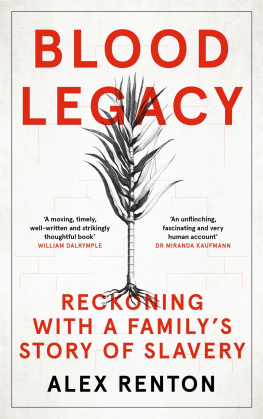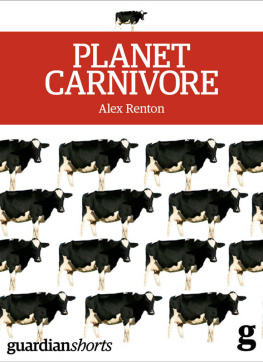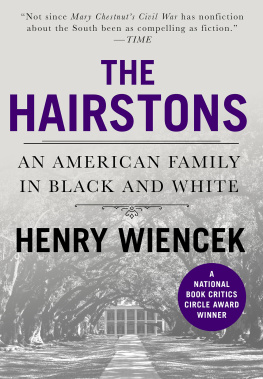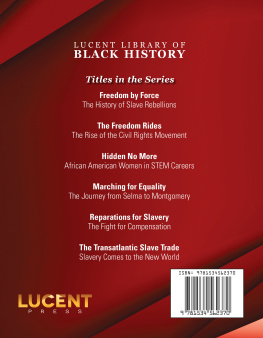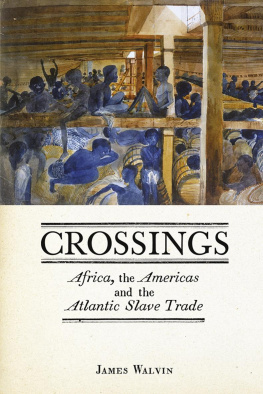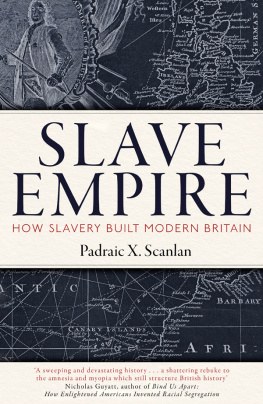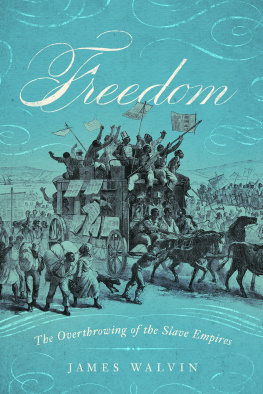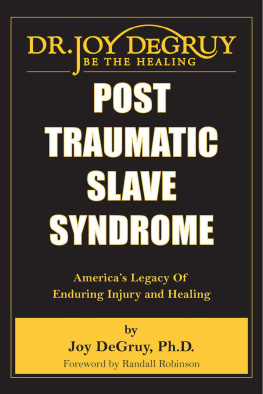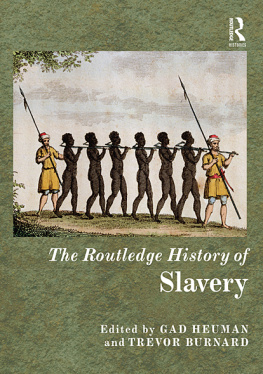
Also by Alex Renton
Stiff Upper Lip: Secrets, Crimes and the
Schooling of a Ruling Class
Planet Carnivore
First published in Great Britain, the USA and Canada in 2021
by Canongate Books Ltd, 14 High Street, Edinburgh EH1 1TE
Distributed in the USA by Publishers Group West and in Canada by Publishers Group Canada
canongate.co.uk
This digital edition first published in 2021 by Canongate Books
Copyright Alex Renton, 2021
Maps by Jamie Whyte
The right of Alex Renton to be identified as the author of this work has been asserted by him in accordance with the Copyright, Designs and Patents Act 1988
Every effort has been made to trace copyright holders and obtain their permission for the use of copyright material. The publisher apologises for any errors or omissions and would be grateful if notified of any corrections that should be incorporated in future reprints or editions of this book.
For image credits please see
British Library Cataloguing-in-Publication Data
A catalogue record for this book is available on
request from the British Library
ISBN 978 1 78689 886 9
eISBN 978 1 78689 887 6
To Elizabeth Delaroche,
born in Jamaica in 1761,
and her mother Mary, whose African
birth name is unknown
NOTES
Language
As the history of transatlantic and plantation enslavement has been re-examined, a debate has begun over the language used to discuss slavery, the associated industries and the millions of people whose lives were ended or altered by it. The point has been made that some words traditionally employed tend to dehumanise: for example, slave defines a person by the role forced on them by their exploiters. For many, slavery itself is an outmoded and unsatisfactory term. This discussion is still evolving: I have attempted to reflect current thinking, as far as I am aware of it, in the language used in this book.
Sources
The Fergusson of Kilkerran papers, the main archive on which this book is based, are owned by Sir Charles Fergusson. A catalogue is available from the National Records of Scotland (NRAS 3572). More information and further notes on sources at bloodlegacybook.com.
Relative value
My distant great-uncle James Fergusson had two dairy cows at his plantation in Tobago in the year 1777. They were valued at 15 each so what would they be worth today?
There is little consensus on how to calculate this. The simplest method is to use relative price worth (RPW), which uses the average prices of a range of goods and services as they were in the base year and compares with the same today: it is how we measure inflation. But as time passes RPW gets less meaningful, not least because the things we commonly buy change, as do production methods and availability.
For academic historians wage growth and income worth are more useful. The relative wealth index (RWI) calculates change in prices according to change in purchasing power, using data on average earnings for all workers or labour/income value. A third, relative output worth (ROW), calculates sums according to the gross domestic product of a country in the base year, and then adjusts according to the change in GDP per capita between then and the target year. It is most useful for national economies.
Each system gives very different results. That 15 cow in 1777 is worth 1,950 today according to RPW, 24,760 according to RWI and 28,800 using ROW. In August 2020 the average price of a newly calved heifer in Britain was in fact 1,524, so RPW looks like a good indicator. However, the real price of farm animals and of food has dropped immensely since the eighteenth century, with the industrialisation of agriculture. So RWI may be the better indicator.
RWI seems to work for larger sums, especially in property. An Edinburgh town house is reported to have cost 1,000 in 1800: that equates to 81,300 using RPW, but a more realistic 1.1 million using RWI. The Hunter Blair family, who owned a plantation and enslaved people with the Fergussons, spent 34,000 in 1798 buying Blairquhan Castle and 12,000 acres of land, some of it moor and woodland but also pasture and farms. Using RPW that 34,000 equates to 3.3 million, but using RWI it comes to 42.1 million. In 2012 Blairquhan Castle and 675 acres were sold for 4.85 million. The other 10,000 acres of mixed farm and forest land in Scotland today might cost around 40 million.
Unless indicated otherwise, this book follows most academic practice in using RWI. More information can be found at measuringworth. com, whose calculators I have used. Today is the year 2020.
Reparations and this book
Some members of my family are donating to educational and youth welfare projects in the Caribbean and in the UK. While recognising that the damage done by slavery cannot be repaired, nor the descendants of the people who were enslaved adequately compensated, there is still an opportunity for people who have benefited from this past to do what they are able to change the continuing consequences of it. More details at bloodlegacybook.com.
Any profits from this book will be given to similar causes.
The Caricom group of nations is seeking to begin discussions about reparation with Europes former slaving nations. This is discussed in Chapter 18, Jamaica today. More information can be found at caricomreparations.org.
INTRODUCTION
It is a privilege to learn about racism instead of experiencing it your whole life.
Sign at a Black Lives Matter rally,
June 2020
I AM AN HEIR OF Britains slavery past. It marks my mind, my culture, my DNA. I am a descendant of the owners of enslaved people, and of traders in them; of a campaigner for the abolition of slavery and of an enslaved African woman. Like me, the Britain in which I grew up is a place shaped, in no small way, by transatlantic and plantation slavery and the many industries that thrived on them. I am part of the legacy that lives on, economically and culturally, visible not just in grand houses and old statues, but in the systemic and street-level racism that afflicts our country today.
Like most of us, I am a mess of differing inheritances, but the person I present to the world is pretty much the one formed by the wealthy people of my ancestry. As a white, middle-class Briton I am so shielded from everyday racism I rarely notice it. While most of the wealth my ancestors accrued was long ago spent, the privilege garnered from it still protects and supports me. The history of Britain and slavery, worked and glossed to make it distant and irrelevant, is the foundation of my comfortable, liberal life.
My family keeps archives. When I read the papers there that documented our forebears activities in the Caribbean, most of them carefully annotated by my historian grandfather, I knew that the story they contained had to be brought to the light. I felt it wrong to keep the history from the descendants of the enslaved people who had worked and died on our plantations. Most of the wider family, including my own children, knew nothing of this past. So, with the agreement of the owners of the archive, there began a job of photographing and transcribing the papers. What I discovered profoundly challenged my assumptions about who I was, about the history I had been taught, and about Britain today.
The papers make it possible to untangle some of what happened in Tobago and Jamaica. But a huge hole will always remain where the accounts of the 950 or so people who were enslaved by my ancestors should sit. We have the direct testimony of just one of them. That fact renders this only half a narrative, one that hardly deserves to be called history. So, it is the story of my mothers family, the Fergussons, their partners the Hunter Blairs and the Britain that, not so long ago, tolerated the enslaving of human beings for profit. It is also about the legacy, still toxic, still harming people, 180 years after emancipation in the British Caribbean.

